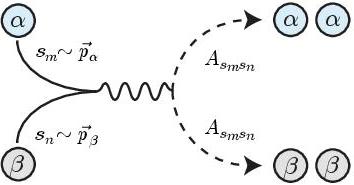Specialization and Bet Hedging in Heterogeneous Populations
Steffen Rulands, David Jahn and Erwin Frey
Motivated by these questions, we consider spatially extended populations which are initially genetically diverse and contain varying degrees of phenotypic heterogeneity. Remarkably, we find that the evolution of genetic diversity and phenotypic heterogeneity both depend on the degree of mobility and the type of competition between individuals.
For direct competition, as in predator-prey interactions, we find that genetic diversity is lost slowly. The evolution of phenotypic heterogeneity strongly depends on three distinct regimes in the degree of mobility: While specialization to one of the phenotypic states is evolutionarily most successful for small values of the diffusion constant, generalists take over the population in well-mixed situations. For intermediate values of the diffusion constant individuals balance bet-hedging with specialization. By contrast, for indirect competition, mediated by the limited availability of resources, genetic diversity is lost more rapidly. In addition, we show that specialization to one one of the phenotypic states is dominant for all values of the diffusion constant.
We demonstrate these findings examplarily for systems of three cyclically competing species, which have been extensively used to, for example, describe competition between E. coli strains. Since we find strikingly similar results for a model comprising more complex interactions, we expect that our results are generic in the sense that they only depend on the properties of the underlying nonlinear dynamics.


